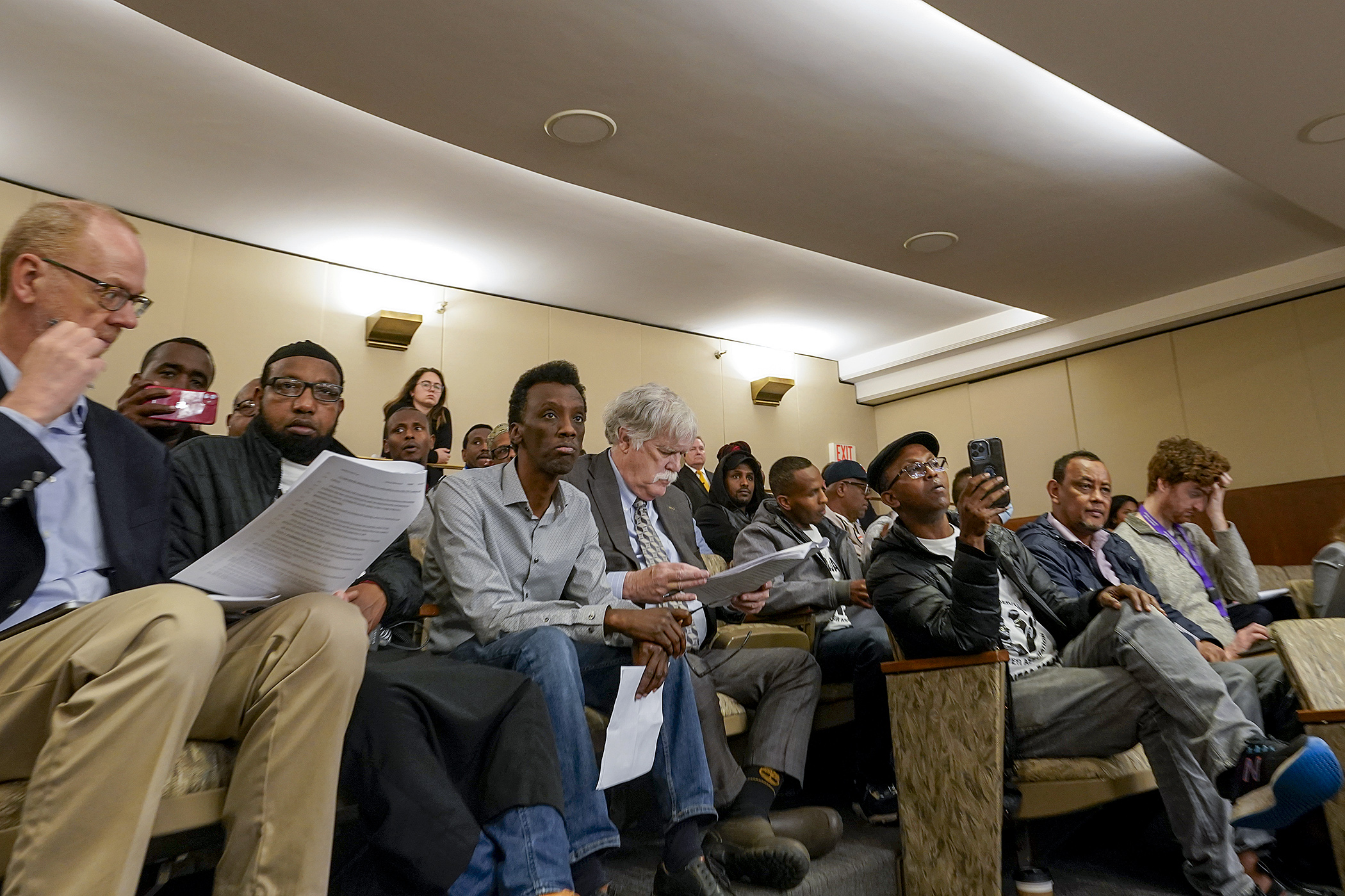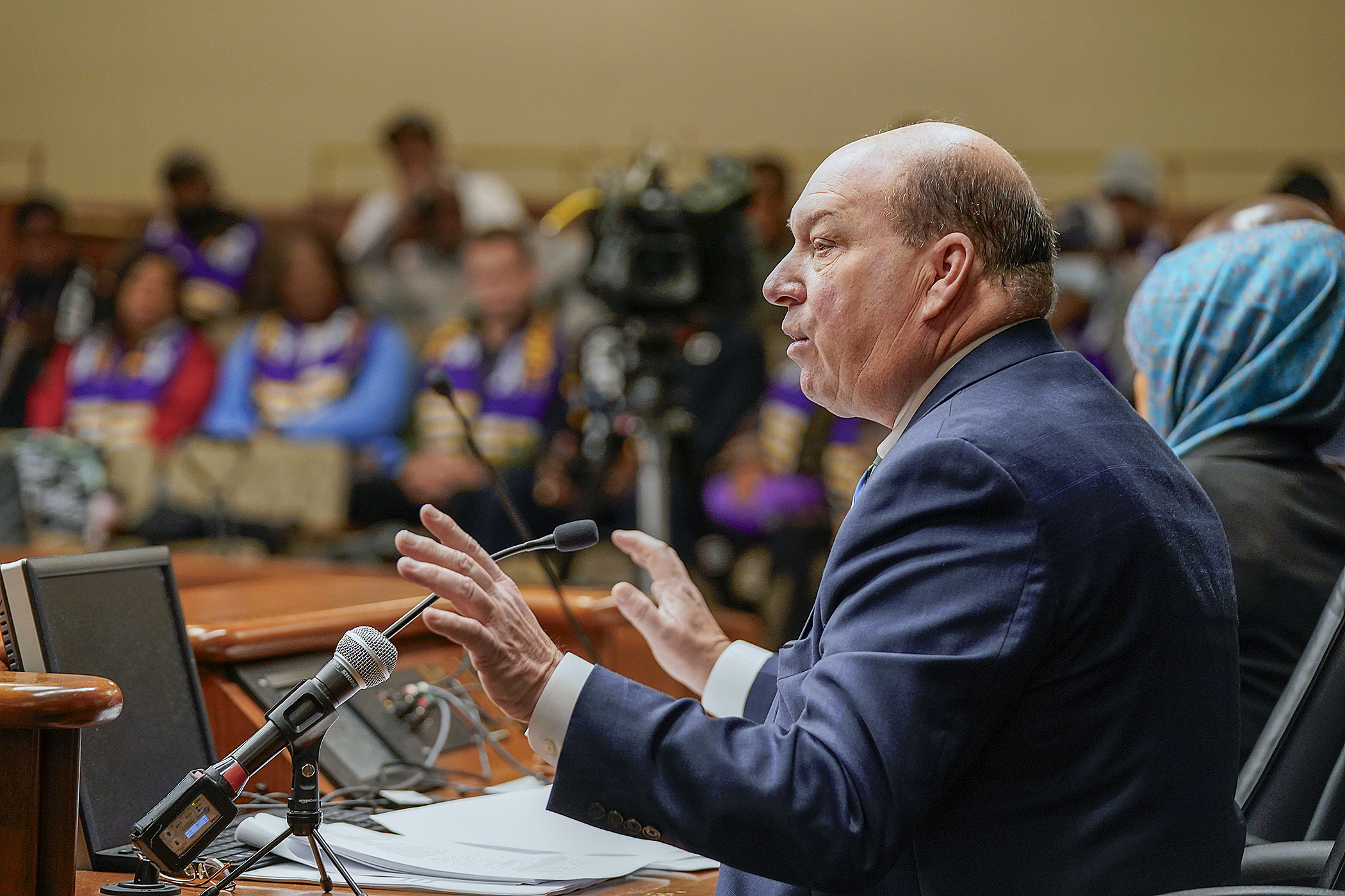Labor panel approves rideshare pay compromise; Uber, Lyft say rate ‘not supportable’

A compromise reached Monday between legislative leaders, the Minneapolis City Council and rideshare drivers would give the drivers a raise they say is needed.
But representatives for ride-hailing companies Uber and Lyft say the agreed-upon pay mandate would be damaging for riders and drivers, and both companies would be forced to shut down throughout the state. Nor were they involved in the negotiations.
The House Labor and Industry Finance and Policy Committee took an initial step toward that outcome Tuesday by approving HF4746, as amended, on an 8-4, party-line vote and referring it to the House Ways and Means Committee.
Sponsored by Rep. Hodan Hassan (DFL-Mpls), the bill would mandate rideshare companies pay a statewide minimum wage rate of $1.27 per mile and 49 cents per minute for any transportation of a rider by a driver.
 Joel Carlson, representing Uber, testifies before the House Labor and Industry Finance and Policy Committee May 7 about an agreement to regulate transportation network companies. (Photo by Michele Jokinen)
Joel Carlson, representing Uber, testifies before the House Labor and Industry Finance and Policy Committee May 7 about an agreement to regulate transportation network companies. (Photo by Michele Jokinen)“House File 4746 seeks to respond to practices that companies like Uber and Lyft and others employ to lower costs and undercut their rivals,” Hassan said. “This bill is about justice. It’s about protection. … It’s about defending the people from greed. Minnesota has a great history of protecting workers, and I hope we can continue that today.”
But representatives for Uber and Lyft said the pay rate would still make their service unsustainable in Minnesota.
“The rate that is in the [amended bill] at $1.27 [a mile] is just not supportable economically,” said Joel Carlson, representing Uber. “We know when you price rides out of the reach of riders that utilization goes down. What is in this, we think, is business ending for Minnesota and we can’t support it at the level that it’s at.”
Rep. Joe McDonald (R-Delano) mirrored concerns the bill will outprice the apps usefulness.
“I will not, and many, many others just simply won’t use the program,” he said. “It’ll be too costly. It’ll diminish the driver’s ability to make a living.”
Drivers are classified as independent contractors, and don’t receive benefits like unemployment insurance and overtime. The bill would not change that. However, rideshare companies would be mandated to provide drivers with vehicle insurance and compensation for injuries occurring while driving to pick up passengers or transporting them.
In March, the Minneapolis City Council voted to require rideshare drivers in the city be paid at least $1.40 per mile and 51 cents per minute, prompting rideshare companies Uber and Lyft to threaten to stop service in Minneapolis and the Twin Cities area May 1, when the change would have been enacted.
Recommendations from a task force established last year by Gov. Tim Walz were then released, finding that a lower rate of 89 cents per mile and 49 cents per minute would meet the Minneapolis minimum wage requirements.
The council voted in April to delay implementation of the ordinance to July 1, giving all stakeholders more time to come up with a compromise and putting pressure on the Legislature to find a solution.
Among other provisions, the bill would also:
- spell out pay transparency requirements and prohibitions against discrimination and retaliation;
- grant drivers the right to appeal a deactivation, providing an avenue to possibly reactivate their account on a rideshare app; and
- appropriate $173,000 in fiscal year 2025 from the General Fund for enforcement, education, and outreach, with a base of $123,000 for fiscal year 2026 and beyond.
— Session Daily writer Tim Walker contributed to this story.
Related Articles
Search Session Daily
Advanced Search OptionsPriority Dailies
Ways and Means Committee OKs proposed $512 million supplemental budget on party-line vote
By Mike Cook Meeting more needs or fiscal irresponsibility is one way to sum up the differences among the two parties on a supplemental spending package a year after a $72 billion state budg...
Meeting more needs or fiscal irresponsibility is one way to sum up the differences among the two parties on a supplemental spending package a year after a $72 billion state budg...
Minnesota’s projected budget surplus balloons to $3.7 billion, but fiscal pressure still looms
By Rob Hubbard Just as Minnesota has experienced a warmer winter than usual, so has the state’s budget outlook warmed over the past few months.
On Thursday, Minnesota Management and Budget...
Just as Minnesota has experienced a warmer winter than usual, so has the state’s budget outlook warmed over the past few months.
On Thursday, Minnesota Management and Budget...